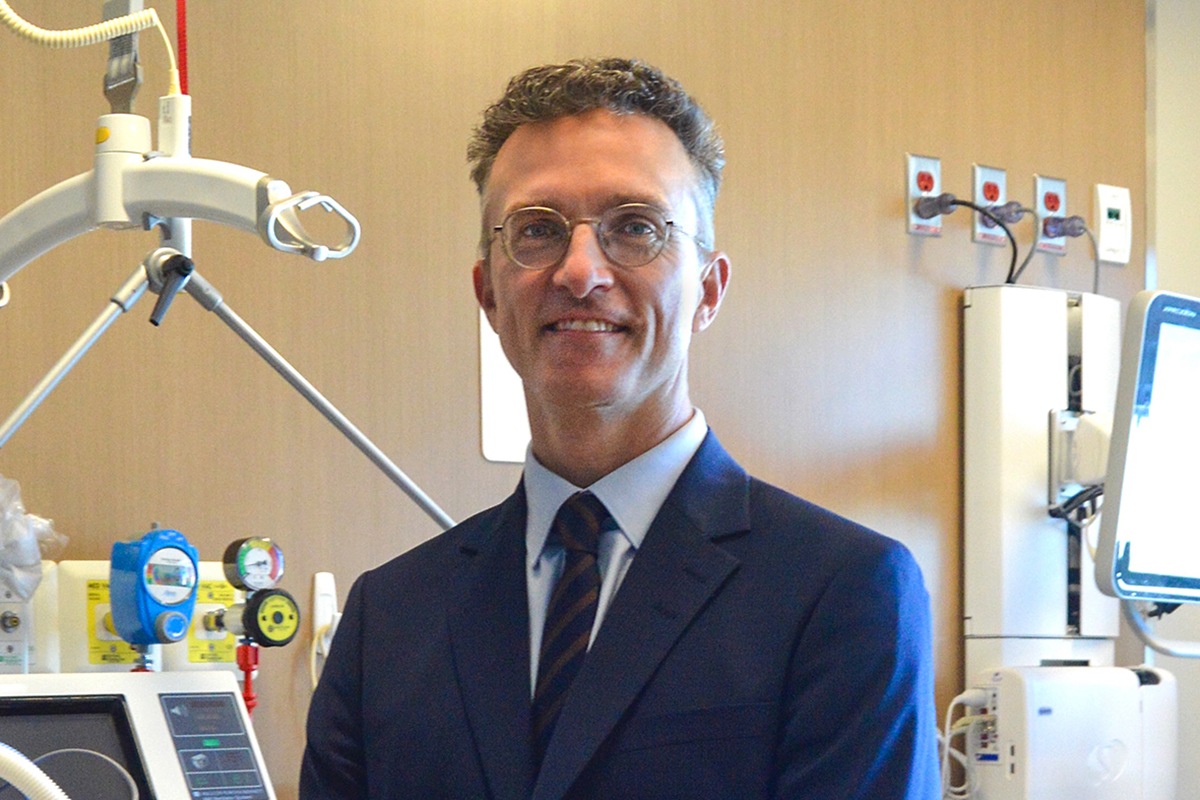
Dr. Ryan Zarychanski co-leads the team that will conduct a multi-site clinical trial of dexamethasone as a treatment for hospitalized patients with pneumonia.
UM team receives $6.9 million to test pneumonia treatment and expand network of research sites
An international, UM-led clinical trial to assess the effects of a steroid drug on patients hospitalized with pneumonia has been awarded $6.9 million by the Canadian Institutes of Health Research, the federal government announced on Aug. 13.
The three-year research project, “Dexamethasone for preventing deterioration in community-acquired pneumonia (DEFEND-CAP),” is co-led by Dr. Ryan Zarychanski, professor of internal medicine, and Dr. Sylvain Lother, assistant professor of internal medicine, at UM’s Max Rady College of Medicine.
The project, the largest international clinical trial ever sponsored by UM, will be jointly managed by the Manitoba-based George & Fay Yee Centre for Healthcare Innovation (CHI) and the Ontario-based Ozmosis Research.
Zarychanski is a hematologist (blood specialist), critical care physician and research scientist who holds the Lyonel G. Israels Chair in Hematology at UM. He is also affiliated with CancerCare Manitoba and CHI.
He and Lother, along with Dayna Solvason, research project manager at CHI, head a team of clinical trial experts who have led large, multi-site randomized controlled trials in the fields of sepsis and COVID-19.
In 2023, Doctors Manitoba named Zarychanski Physician of the Year for his groundbreaking work during the pandemic to establish a global network of scientists and rapidly assess potential treatments for COVID-19.
Community-acquired pneumonia (CAP), meaning pneumonia contracted in the community, is a leading cause of death globally. Most patients with CAP are cared for on a regular hospital ward, not in an intensive care unit (ICU). Antibiotics are the standard treatment.
The DEFEND-CAP trial will assess the impact of treating these patients with dexamethasone – an inexpensive, widely available steroid drug that is commonly used to treat inflammation – in addition to antibiotics.
Adult CAP patients who do not have COVID-19 and are admitted to wards at 60 hospitals across Canada, the U.S. and Brazil will be asked to participate in the double-blind study.
“Participants will be randomly assigned to a group that will receive the drug, or a control group that will receive a placebo,” Zarychanski said. “Dexamethasone has already shown some benefit in critically ill CAP patients. Now we want to see for the first time whether it will reduce progression to organ failure and death in patients who aren’t sick enough to be in the ICU.”
The DEFEND-CAP funding will enable the research team to add more sites to the initial 60-site hospital ward trial network, to a maximum enrolment of 4,000 patients.
Canada currently has a critical lack of capacity and infrastructure for conducting clinical trials on hospital wards, the scientists said. So expanding the Canadian ward-based network will have lasting benefits.
“We’re developing Canada’s first post-pandemic, ward-based platform for conducting trials to fight respiratory illnesses,” said Lother. “Having this established system at hospitals throughout Canada will help us prepare for future pandemics or health emergencies. The network of sites will be able to pivot quickly to test treatments for new respiratory diseases.”
If the DEFEND-CAP study finds that dexamethasone improves outcomes in patients with community-acquired pneumonia, the researchers said, they expect a “paradigm shift” in how lung infections are treated worldwide.
Other UM members of the clinical trial team include Drs. Yoav Keynan, Anand Kumar, Asher Mendelson, Barret Rush and Jennifer Yamamoto, along with project manager Chantale Pineau. Drs. Emily McDonald and Patrick Lawler of McGill University are also partners in the study.






